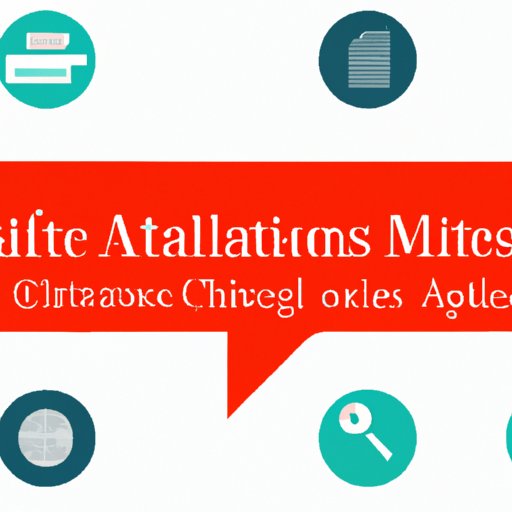
I. Introduction
When writing academic or research papers, citing sources is crucial to avoiding plagiarism and giving credit to the original author or source. However, many writers struggle to cite online sources, especially websites. With the abundance of information available online, it can be challenging to determine which information to include and how to format it correctly.
The purpose of this article is to provide readers with an easy-to-follow guide on how to cite websites accurately and consistently. By following these tips, you can avoid plagiarism, enhance your writing’s credibility, and demonstrate your trustworthiness as a researcher or writer.
Citing sources, including websites, is essential in different academic fields, such as social sciences, humanities, business, and science. Not only does it show respect for the original author, but it also indicates the quality of your research and your credibility as a researcher in your field.
II. Different Citation Styles
The most commonly used citation styles are MLA (Modern Language Association), APA (American Psychological Association), Chicago Manual of Style, and Harvard. Each style has its own set of guidelines, and you need to be familiar with the differences and similarities between them.
MLA is often used in literature, arts, and humanities, while APA is common in social sciences and health sciences. Chicago Manual of Style is frequently employed in history, social sciences, and publishing, and Harvard is a widely-used style in social sciences.
Each style has its unique history and common usage. Knowing what each style entails will help you choose the most suitable one for your work.
III. Components of a Citation
When citing a website, there are several essential components that you should include, such as the author’s name, publication date, title of the webpage, name of the website, and URL or DOI.
The author’s name can be an individual, an organization, or a group of authors. The publication date refers to the date the webpage was created or updated. The title of the webpage should be in title-case and enclosed in quotation marks, while the name of the website should be italicized.
The URL or DOI is the address of the webpage and should be located within angled brackets.
By including these components, your reader can trace the source of your information, and you can demonstrate your research’s credibility and accuracy.
IV. How to Cite a Website using Different Styles
Each citation style has its own set of rules for citing websites. Here is a step-by-step guide on how to cite a website using different citation styles:
MLA
- Name of the author(s).
- “Title of the webpage,”
- Name of the website,
- Publisher or sponsor of the website (if not available, use N.p.),
- Date of publication,
- URL.
Example: Doe, John. “The impact of global warming on the Arctic region.” Arctic Research. N.p., 10 Apr. 2021. Web. 20 Apr. 2021. <https://www.arcticresearch.org/article123>.
APA
- Name of the author(s).
- (Year of publication).
- Title of the webpage.
- Name of the website.
- URL.
Example: Doe, J. (2021). The impact of global warming on the Arctic region. Arctic Research. https://www.arcticresearch.org/article123
Chicago Manual of Style
- Name of the author(s).
- “Title of the webpage”.
- Name of the website,
- Date of publication,
- URL.
Example: Doe, John. “The impact of global warming on the Arctic region.” Arctic Research, April 10, 2021. https://www.arcticresearch.org/article123.
Harvard
- Name of the author(s).
- (Year of publication).
- “Title of the webpage.”
- Name of the website.
- Available at: URL [Accessed Date].
Example: Doe, J., (2021). The impact of global warming on the Arctic region. Arctic Research. Available at: https://www.arcticresearch.org/article123 [Accessed 20 April 2021].
V. Importance of Accuracy and Consistency in Citation
Accurate citation is essential not only to avoid plagiarism but also to give credit to the original author. Inaccurate or incomplete citations can lead to incorrect information being attributed to the wrong source. Additionally, Inconsistent citation styles can create confusion for your readers and negatively impact your research credibility.
Therefore, taking the time to double-check your citations for accuracy and consistency is crucial. You can use reference management software such as EndNote or Mendeley to help you keep track of your sources.
VI. Free Online Tools
There are several free online citation tools that you can use to help you with your citation. These tools will help you format your citations correctly and save you time.
A few examples of online tools include EasyBib, Citation Machine, and BibMe. These tools allow you to input the necessary information about the source, and they will automatically generate a citation that adheres to the correct citation style.
VII. Common Mistakes to Avoid when Citing Websites
Despite following the citation guidelines, mistakes can happen, and it is essential to recognize and rectify them. Some common mistakes to avoid when citing websites include:
- Mistakenly cited sources
- Missed punctuation marks
- Missing components, such as the author’s name or publication date
- Incorrect usage of capitalization
The best way to avoid these mistakes is to double-check your citations and, if possible, have someone else review them for you.
VIII. Conclusion
In conclusion, citing sources, including websites, is an integral part of academic research writing. By following the guidelines of each citation style, one can accurately and consistently cite their sources.
Failing to cite sources or citing them inaccurately can lead to plagiarism or a lack of credibility. However, with the assistance of free online tools and proper review of citations, this can be avoided.
Always strive for accuracy and consistency in your citations, and your research will bear the results of your efforts.




